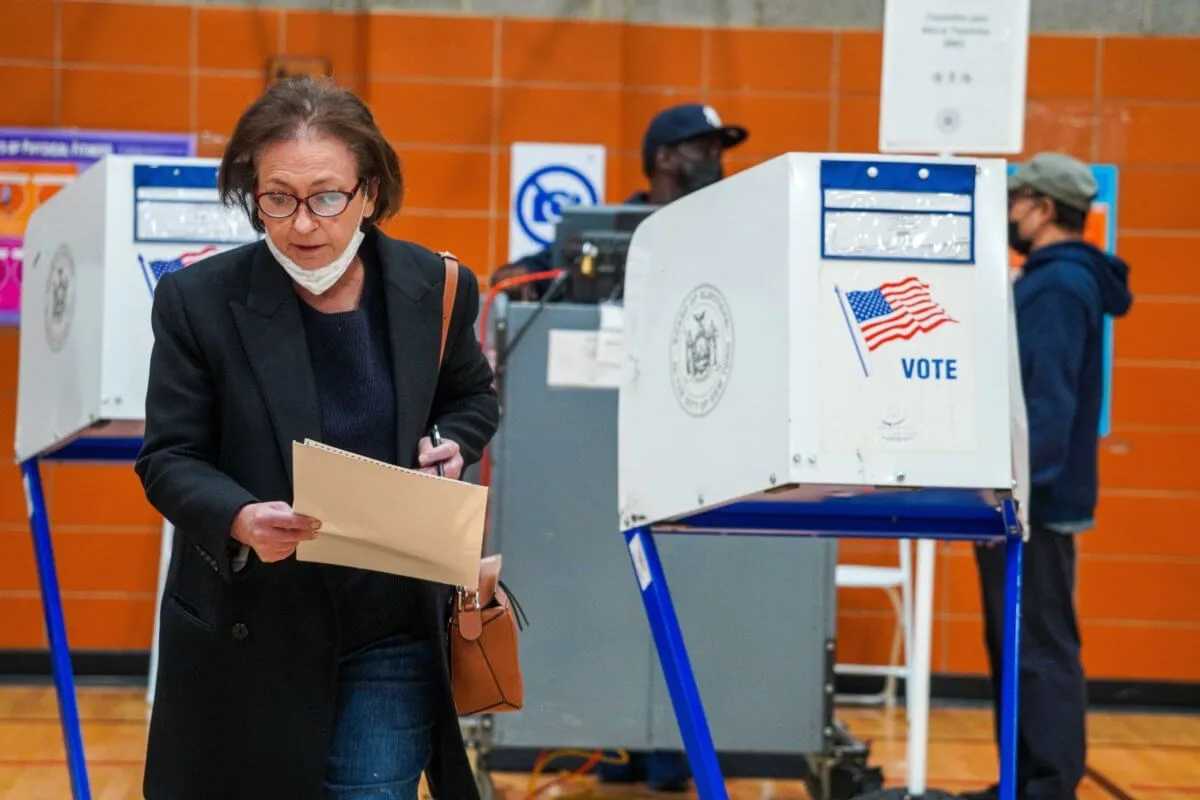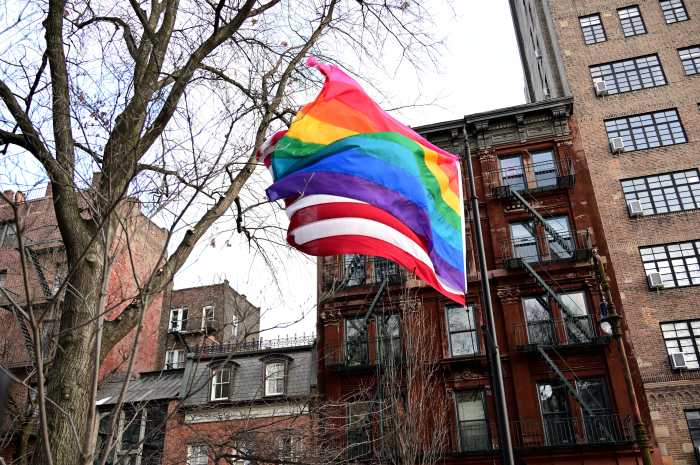Many New Yorkers will be thinking about the pivotal presidential election when they flock to the polls in November, but voters will also have a rare opportunity to shape the future of LGBTQ rights and abortion rights in the State Constitution.
The opposite side of the ballot will feature Proposal 1, or the Equal Rights Amendment, which asks voters to approve or reject an amendment to the Equal Protection of the Law clause of the state constitution — specifically Section 11 of the State Bill of Rights.
“No person shall be denied the equal protection of the laws of this state or any subdivision thereof,” the proposed amendment states. “No person shall, because of race, color, ethnicity, national origin, age, disability, creed, or religion, or sex, including sexual orientation, gender identity, gender expression, pregnancy, pregnancy outcomes, and reproductive healthcare and autonomy, be subjected to any discrimination in their civil rights by any other person or by any firm, corporation, or institution, or by the state or any agency or subdivision of the state pursuant to law.”
The ballot proposal represents the latest effort to bolster protections for LGBTQ individuals and pregnant people in the aftermath of the Supreme Court’s reversal of Roe v. Wade. New York State installed protections on the basis of sexual orientation in 2002 through the passage of the Sexual Orientation Nondiscrimination Act (SONDA), but those safeguards did not extend to transgender and non-binary New Yorkers. It took nearly two more decades for the state to finally pass the Gender Expression Non-Discrimination Act (GENDA) in 2019 to make gender identity and expression a protected class in the state’s human rights and hate crimes laws.
The amendment would deliver a solid layer of protection from government-driven discrimination, according to attorney Matthew Skinner, an expert of LGBTQ law.
“The amendment would unquestionably upgrade the constitutional status of the LGBTQ community in terms of discrimination implemented by state actors,” Skinner told Gay City News. “It would heighten the burden on state actors to successfully justify policies that discriminate against the LGBTQ community.”
While it appears clear that the Equal Rights Amendment would protect New Yorkers from discrimination by the government, it also claims to protect against discrimination by “any other person or by any firm, corporation, or institution” — but it is unclear whether that part is enforceable.
“If it is ever invoked, the part of the amendment addressing discrimination by private actors will require lots of litigation to see if courts require additional enabling legislation, as has been noted as a requirement for the execution of constitutional amendments in older cases decided by the state’s highest court,” Skinner explained.
For example, Skinner cited Brown v. State of New York, a 1996 case in which he said the New York Court of Appeals ruled that constitutional amendments purporting to ban the discriminatory conduct of private parties are not self-executing and require enabling legislation.
Many New Yorkers who support the proposed amendment see it as an important safeguard if the state government someday tries to dismantle GENDA, SONDA, New York’s marriage equality law, or other LGBTQ protections, even if it may not offer total protection. Republican Congressmember Lee Zeldin, who voted against marriage equality as a state lawmaker and against the Equality Act as a congressmember, came within seven points of toppling Governor Kathy Hochul in 2022.
For his part, Zeldin has railed against the proposed amendment by fanning the flames of transphobia, saying it would amount to a “constitutional right for boys to compete in girls’ sports and allow males to use female bathrooms and locker rooms.” He called on New Yorkers to “vote NO!”
Meanwhile, with one month until the election, New York Democrats are working to convince voters to support the proposal. A September press conference to promote the ballot proposal featured Councilmember Erik Bottcher, Assemblymembers Tony Simone and Deborah Glick, and State Senator Brad Hoylman-Sigal, all of whom are out lawmakers representing districts in Manhattan. Out Councilmember Crystal Hudson of Brooklyn joined a “Black Voters for Prop 1” virtual rally on Oct. 2. Another out state lawmaker, Assemblymember Jessica González-Rojas of Queens, has also been advocating for the ballot proposal.
New Yorkers for Equal Rights, which is a coalition of organizations advocating for the Equal Rights Amendment, argues that it is necessary as a shield against discrimination.
“New York’s laws prohibiting discrimination against LGBTQ people were hard fought, and Prop 1 will embed the rights and freedoms ensured by those laws in our State Constitution — so they can never be rolled back,” Sasha Ahuja, the campaign director for New Yorkers for Equal Rights, told Gay City News in a written statement. “Right now, LGBTQ people’s civil liberties are being attacked and rescinded all over the country; in the 2022 election, New York saw the biggest shift to the right of any state in the nation. No one should ever face discrimination from the government because of who they are or who they love. Prop 1 will guarantee that the rights and freedoms of LGBTQ people are permanently protected in New York, regardless of any shifts in the political winds.”
The New Pride Agenda, a statewide LGBTQ education and advocacy organization headquartered in New York City, is calling on voters across the Empire State to vote in favor of the proposal.
“Whether it’s gender-affirming care or access to abortion, all across the country politicians are taking away our freedom to make decisions about our own bodies,” New Pride Agenda executive director Elisa Crespo told Gay City News. “While New York is a nation leading state on these fronts, we know just how volatile and unpredictable politics can be. We cannot take our rights for granted.”
Crespo added: “On November 5, we will not be distracted or divided by blatant misinformation or fear mongering. We will come together to send a verdict that bodily autonomy and freedom are cornerstones of our values as New Yorkers. We encourage voters to vote Yes on Prop 1, to enshrine our existing protections into the state Constitution.”





































